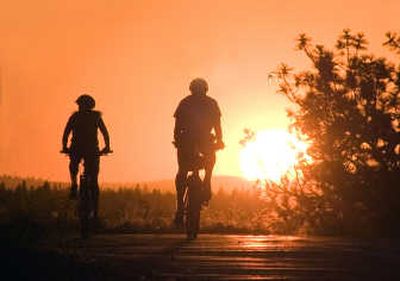Clean energy: Hot days boost air pollution

Squeeze that gas nozzle past the first click and you just contributed to ozone pollution.
Fill up the tank before 5 p.m. and you’re increasing smog.
As the temperature rises this week, so do the warnings and preventive measures issued by local organizations.
“High temperatures mean the highest ozone levels,” said Spokane Regional Clean Air Agency spokeswoman Lisa Woodard, “and we are shifting our emphasis because we are seeing ozone levels on the rise.” Ozone levels peaked in 2003 with the area’s wildfires and then fell, but they have climbed steadily since 2005.
Since the ozone-fearing summer season begins with consistent 100-degree weather, Woodard wants people to become increasingly aware about a topic that sounds only remotely familiar.
“The big thing I hear is, ‘I thought ozone was a good thing,’ ” she said. “It’s good when it’s high above the Earth, but when it is at ground level it’s a hazardous air pollutant.”
Woodard said it’s difficult to categorize because nothing emits ozone. Instead, when drivers fill up their tanks or people mow their lawns under the baking sun, vapors are released into the air that become pollutants. They are especially dangerous now since ozone levels peak on clear days with temperatures upwards of 90 degrees. High ozone levels are linked to respiratory disease.
“Children are the most vulnerable because their lungs are still developing, and they are taking in a lot of air outside in the summer,” said Woodard.
The Spokane Regional Clean Air Agency also advises people to avoid using lighter fluid, mow the lawn in the evening and keep tires inflated to improve gas mileage. But it’s the midday refueling warning that surprised most residents filling their tanks Wednesday afternoon.
“You’re not supposed to (pump gas) until after 5 p.m.?” asked a startled Jose Castaneda, 20, who stopped at a Second Avenue Shell station to fill up for his trek to the lake. “It makes sense. I backed away because I could feel the vapors.”
He looked at the inflatable pink water toy sticking out of the back of his white Ford pickup and said he’s increasingly concerned about the effects of excessive heat mingled with pollution. “Now I wonder if I should have this big truck,” he said.
The agency isn’t the only organization taking preventive action. Avista Corp. just announced that it will manually re-energize tripped power lines because of the dry weather instead of its usual policy of resetting them automatically. While this will leave unlucky residents without power longer, it remains a necessary precaution, said Avista spokesman Hugh Imhof.
For Avista customers who don’t get stuck waiting for manual power line rescue, the summer power supply should be sufficient, said Imhof. “The markets are better this year, and everything looks pretty good at this point,” he said.
Still, don’t use heat-producing appliances like dishwashers and ovens until after 7 p.m., and keep blinds closed when the sun pours in, Avista said in its suggestions for energy efficiency this summer.
The hot and dry conditions are causing federal and state land managers to issue their own warnings. The Okanogan-Wenatchee National Forest, Idaho Department of Parks and Recreation and the Bureau of Land Management in Eastern Washington asked campers to limit activities that could start wildfires and banned campfires and stove fires at some recreation sites.
As temperatures near record levels, the Spokane Regional Health District also has advice. Don’t drink beer and claim it’s a replenishing fluid. Don’t wear dark clothes. Don’t exercise too much, and don’t forget sunscreen.
To George Ward, 50, who refilled his tank before 5 p.m., too many weather warnings have left him fed up. He’s already hot and tired.
“Still gonna do it the way I’ve been doing it,” he said, before driving away with all the windows down.